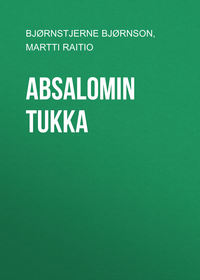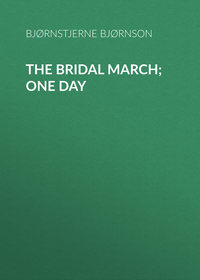 полная версия
полная версияMagnhild; Dust
The governess decked her in her bridal finery the next day; the mistress of the house too came to look on. This gave her great pleasure, she said. Magnhild let everything be done for her without stirring, without uttering a word and without shedding a tear.
It was the same in the sitting-room. She was motionless. A feeling akin to defiance had taken possession of her. The men-servants and the house-maids sat and stood by the kitchen door, which was ajar, and just inside of it; Magnhild saw, too, the heads of little children. The deacon started the singing as the priest came down-stairs.
Magnhild did not look at the bridegroom. The priest touched on tender chords; his wife shed tears, and so too did the governess; but Magnhild's icy coldness chilled both him and them. The discourse was brief and dealt chiefly in mere generalities. It was followed by congratulations, and a painful silence; even the saddler had lost his smile. It was a relief when they were summoned to dinner.
During the repast the priest, desiring to propose a toast, began: "Dear Magnhild! I trust you have no fault to find with us," – he got no farther, for here Magnhild burst into such convulsive weeping that the priest's wife, the governess, aye, even the priest himself became deeply affected, and there arose a long and painful silence. Finally, however, the priest managed to add: "Think of us!" But these words were followed by the same heart-rending weeping as before, so that no toast was drunk. What this really signified was not clear to any of those present, unless perhaps to the bridegroom; and he said nothing.
While they were at dessert one of the young girls approached the bride and whispered a few words in her ear. Rönnaug was outside and wished to say farewell; she had been waiting ever since the company had gone to table and could stay no longer. Rönnaug was standing on the back porch, benumbed with the cold; she did not wish to intrude, she said. She examined the bride's dress, thought it extraordinarily fine, and drawing off one mitten stroked it with the back of her hand.
"Yes, I dare say he is rich," said she, "but if they had given me a gown of silver I would not" – and she added a few words which cannot be repeated here, and for which Magnhild, her face flaming, administered a good sound box on the ear. The kerchief softened the blow somewhat, but it was seriously meant.
Magnhild returned to the dining-room and sat down, not in her place at the bridegroom's side, but on a chair by the window; she did not wish anything more, she said. It was of no avail that she was entreated to sit with the others at least until they had finished; she said she could not.
The departure took place shortly after coffee was served. An incident had meanwhile occurred which suppressed all emotion, of whatever nature it might be. It was that the bridegroom suddenly appeared, looking like a shaggy beast, carrying a fur cape, fur boots, a short coat, a hood, fur gloves, and a muff. He let them fall in front of Magnhild, saying with dry earnestness, —
"All these I lay at your feet!"
There burst forth a peal of laughter in which even Magnhild was forced to join. The whole bridal party gathered about the things which were spread over the carpet, and every one was loud in praise. It was evidently not displeasing to Magnhild either, in the face of a winter journey, – for which she had been promised the loan of a variety of wraps, – to have such presents lavished upon her.
In a few moments more Magnhild was attired in her blue dress, and she was enough of a child or rather woman to be diverted by the change. Shortly afterwards the new traveling wraps were donned, piece by piece, amid the liveliest interest of all, which reached its height when Magnhild was drawn before the mirror to see for herself how she looked. The horse had been driven round, and Skarlie just now came into the room, also dressed for traveling, and wearing a dog-skin coat, deer-skin shoes and leggings, and a flat fur cap. He was nearly as broad as he was long, and in order to raise a laugh, he limped up to the mirror, and, with dry humor in his face, took his stand beside Magnhild. There followed a burst of laughter, in which even Magnhild herself joined – but only to become at once entirely mute again. Her silence still hung over the parting. Not until the parsonage was left behind did she become again dissolved in tears.
Her eyes wandered listlessly over the snow-covered heap of ruins on the site of her childhood's home; it seemed as though there were that within herself which was shrouded in snow and desolation.
The weather was cold. The valley grew narrower, the road led through a dense wood. One solitary star was visible.
Skarlie had been cutting figures in the snow with his whip; he now pointed the latter toward the star and began to hum, finally to sing. The melody he had chosen was that of one of the ballads of the Scottish highlands. Like a melancholy bird, it flitted from one snow-laden fir-tree to another. Magnhild inquired its meaning, and this proved to be in harmony with a journey through the depths of a forest. Skarlie talked further about Scotland, its history, his sojourn there.
Once started, he continued, and gradually broke into such merry anecdotes that Magnhild was astonished when they stopped to rest; astonished that she had been able to laugh, and that they had driven nearly fourteen miles.
Skarlie helped her out of the sledge and ushered her into the inn, but he himself went directly out again to feed the horse.
A stylish looking young lady sat by the hearth in the guest-room warming herself, scattered over the benches around were her traveling-wraps; they were of such fine material and costly fur that Magnhild grew curious and felt obliged to touch them. The traveling-suit the lady wore, so far as material and style was concerned, made the same impression on Magnhild as she might have gained from a zoölogical specimen from another quarter of the globe. The lady's face possessed youth and a gentle melancholy; she was fair and had languishing eyes and a slightly-curved nose. Her hair, too, was done up in an unfamiliar style. Pacing the floor was a slender young man; his traveling boots stood by the hearth and his feet were cased in small morocco slippers, lined with fur. His movements were lithe and graceful.
"Are you Skarlie's young wife?" inquired the hostess, quite an old woman, who had placed a chair by the hearth for Magnhild. Before Magnhild could reply, Skarlie came in with some things from the sledge. The bald head, half protruding from the shaggy furs, the deer-skin shoes, sprawling like monstrous roots over the floor, attracted the wondering gaze of the young lady.
"Is this your wife?" repeated the hostess.
"Yes, this is my wife," was the cheerful reply, as Skarlie limped forward.
The young man fixed his eyes on Magnhild. She felt herself growing fiery red beneath his gaze. There was an expression entirely new to her in his face. Was it scorn? The lady, too, now looked at her, and at the same moment the hostess begged Magnhild to take a seat by the fire. But the latter preferred remaining in the dark, on a bench in the farthest corner.
It was fully ten o'clock when the Point was reached, but every light there had been extinguished, even in the house in front of which the sledge stopped. An old woman, awakened by the jingling of the bells, came to the street door, opened it and looked out, then drew back and struck a light. She met Magnhild in the passage, cast the light on her and said finally, "I bid you welcome."
A strong smell of leather filled the passage; for the work-room and shop were to the left. The loathsome odor prevented Magnhild from replying. They entered a room to the right. Here Magnhild hastily removed her traveling-wraps; – she felt faint. Without casting a glance about her, or speaking to the woman who was watching her from behind the light, she then crossed the floor and opened a door she had espied on coming into the room. She first held the light in, then stepped in herself and closed the door after her. The woman heard a rumbling within and went to the door. There she discovered that one of the beds was being moved. Directly afterward Magnhild reappeared with the candle. The light revealed a flushed face. She looked resolute.
She now told the woman she had no need of her services.
The saddler did not come in for some time; for he had been seeing to the horse, which he had borrowed for the journey. The light was still on the table. There was no one up.
CHAPTER IV
Two years had passed since that evening, and the greater part of a third.
Magnhild was quite as thoroughly accustomed to the new daily routine as she had been to the old.
The priest visited her three or four times a year; he slept in the room over the workshop usually occupied by Skarlie when he was at home. During the day the priest visited at the captain's, or the custom-house officer's, or at the home of the chief of police. His coming was called the "priestly visitation."
There was chess-playing in the day-time and cards in the evening. The priest's wife and young lady daughters had also been seen at the Point a few times. In the lading-town there was scarcely any one with whom Magnhild associated.
Skarlie and she had taken one trip to Bergen. Whatever might there have happened or not happened, they never undertook another, either to Bergen or elsewhere.
Skarlie was more frequently absent than at home; he was engaged in speculations; the work-shop was pretty much abandoned, though the store was still kept open. A short time after her arrival, Magnhild had received an invitation from the school committee – most likely through Skarlie's solicitation – to become the head of the industrial school. Henceforth she passed an hour or two every day at the public school; moreover, she gave private instructions to young girls who were grown up. Her time was employed in walking, singing, and a little sewing; she did very little reading, indeed. It was tedious to her.
Directly after she came there, Rönnaug had appeared at the Point, and had hired out at the nearest "skyds" (post-station), in order to earn money speedily for the purchase of a ticket to America. She was determined to live no longer the life of an outcast here, she said.
Magnhild took charge of Rönnaug's money for her, and was alarmed to note how rapidly it increased, for she had her own thoughts about the matter. Now the ticket was bought, Magnhild would be entirely alone.
Many were the thoughts called forth by the fact that the journey across the sea to new and perhaps great experiences should be so easy for one person and not for another.
One morning after a sleepless night, Magnhild took her accustomed walk to the wharf to watch the steamer come in. She saw the usual number of commercial travelers step ashore; the usual number of trunks carried after them; but this day she also observed a pale man, with long, soft hair and large eyes, walking around a box which he finally succeeded in having lifted on a wagon. "Be careful! Be careful!" he repeated again and again. "There must be a piano in the box," thought Magnhild.
After Magnhild had been to school, she saw the same pale man, with the box behind him, standing before the door of her house. He was accompanied by the landlord of one of the hotels. Skarlie had fitted up the rooms above the sitting-room and bed-chamber for the accommodation of travelers when the hotels were full. The pale stranger was an invalid who wished to live quietly.
Magnhild had not thought of letting the rooms to permanent guests and thus assuming a certain responsibility. She stood irresolute. The stranger now drew nearer to her. Such eyes she had never beheld, nor so refined and spiritual a face. With strange power of fascination those wondrous eyes were fixed on her. There was, as it were, two expressions combined in the gaze that held her captive, one behind the other. Magnhild was unable to fathom this accurately; but in the effort to do so she put her forefinger in her mouth, and became so absorbed in thought that she forgot to reply.
Now the stranger's countenance changed; it grew observant. Magnhild felt this, roused herself, blushed, gave some answer and walked away. What did she say? Was it "Yes" or "No"? The landlord followed her. She had said "Yes!" She was obliged to go up-stairs and see whether everything was in readiness for a guest; she did not rely very implicitly on her own habits of order.
There was great confusion when the piano was carried up; it took time, too, to move the bed, sofa, and other articles of furniture to make room for the instrument. But all this came to an end at last, and quiet once more prevailed. The pale stranger must be tired. Soon there was not a step, not a sound, overhead.
There is a difference between the silence which is full and that which is empty.
Magnhild dared not stir. She waited, listened. Would the tones of the piano soon fall upon her ear? The stranger was a composer, so the landlord had said, and Magnhild thought, too, she had read his name in the newspaper. How would it be when such a person played? Surely it would seem as though miracles were being wrought. At all events, something would doubtless ring into her poor life which would long give forth resonance. She needed the revelation of a commanding spirit. Her gaze wandered over the flowers which decorated her window, and on which the sun was now playing; her eyes sought the "Caravan in the Desert," which hung framed and glass covered by the door, and which suddenly seemed to her so animated, so full of beautifully arranged groups and forms. With ear for the twittering of the birds in the opposite neighbor's garden and the sporting of the magpies farther off in the fields, she sat in blissful content and waited.
Through her content there darted the question, "Will Skarlie be pleased with what you have done? Is there not danger of injury to the new sofa and the bed too? The stranger is an invalid, no one can tell" – She sprang to her feet, sought pen, ink, and paper, and for the first time in her life wrote a letter to Skarlie. It took her more than an hour to complete it. This is what she wrote: —
I have let the rooms over the sitting-room and bed-chamber to a sick man who plays the piano. The price is left to you.
I have had one of the new sofas (the hair-cloth) carried up-stairs and one of the spring beds. He wants to be comfortable. Perhaps I have not done right.
Magnhild.She had crossed out the words: "Now I shall have an opportunity to hear some music." The heading of the letter had caused her some trouble; she finally decided to use none. "Your wife," she had written above the signature, but had drawn her pen through it. Thus fashioned, the letter was copied and sent. She felt easier after this, and again sat still and waited. She saw the stranger's dinner carried up to him; she ate a little herself and fell asleep, – she had scarcely had any sleep the previous night.
She awoke; there was yet no sounds of music above. Again she fell asleep, and dreamed that the distance between the mountain peaks had been spanned by a bridge. She told herself that this was the bridge at Cologne, a lithograph of which hung on the wall near the bed-chamber. Nevertheless it extended across the valley from one lofty mountain to the other, supported by trestle-work from the depths below. The longer she gazed the finer, more richly-colored the bridge became; for lo! it was woven of rainbow threads, and was transparent and radiant, all the way up to the straight line from crest to crest. But crosswise above this, the distance was spanned by another bridge. Both bridges began now to vibrate in slow two-fourths time, and immediately the entire valley was transformed into a sea of light, in which there was an intermingled play of all the prismatic hues; but the bridges had vanished. Nor were the mountains any longer visible, and the dissolving colors filled all conceivable space. How great was this? How far could she see? She grew positively alarmed at the infinity of space about her and awoke; – there was music overhead. In front of the house stood a crowd of people, silently gazing at the upper window.
Magnhild did not stir. The tones flowed forth with extreme richness; there was a bright, gentle grace over the music. Magnhild sat listening until it seemed as though these melodious tones were being showered down upon head, hands, and lap. A benediction was being bestowed upon her humble home, the world of tears within was filled with light. She pushed her chair farther back into the corner, and as she sat there she felt that she had been found out by the all-bountiful Providence who had ordered her destiny. The music was the result of a knowledge she did not possess, but it appealed to a passion awakened by it within her soul. She stretched out her arms, drew them in again, and burst into tears.
Long after the music had ceased, – the crowd was gone, the musician still, – Magnhild sat motionless. Life had meaning; she, too, might gain access to a rich world of beauty. As there was now song within, so one day there should be singing around about her. When she came to undress for the night she required both sitting-room and bed-chamber for the purpose, and more than half an hour; for the first time in her life she laid down to rest with a feeling that she had something to rise for in the morning. She listened to the footsteps of her guest above; they were lighter than those of other people; his contact with the furniture, too, was cautious. His eyes, with their kindly glow of good-will, and the fathomless depths beyond this, were the last objects she saw distinctly.
Indescribable days followed. Magnhild went regularly to her lessons, but lost no time in getting home again, where she was received by music and found the house surrounded by listeners. She scarcely went out again the rest of the day. Either her guest was at home and she was waiting for him to play, or he had gone out for a walk, and she was watching for his return. When he greeted her in passing she blushed and drew back. If he came into her room to ask for anything, there ran a thrill through her the moment she heard the approach of his footsteps; she became confused and scarcely comprehended his words when he stood before her. She had, perhaps, not exchanged ten words with him in as many days, but she already knew his most trifling habit and peculiarity of dress. She noticed whether his soft brown hair was brushed behind his ears, or whether it had fallen forward; whether his gray hat was pushed back, or whether it was drawn down over his forehead; whether he wore gloves or not; whether he had a shawl thrown over his shoulders or not. And how was it in regard to herself? Two new summer dresses had been ordered by her, and she was now wearing one of them. She had also purchased a new hat.
She believed that in music lay her vocation; but she felt no inclination to make any kind of a beginning. There was enough to satisfy her in her guest's playing, in his very proximity.
Day by day she developed in budding fullness of thought; her dream-life had prepared her for this; but music was the atmosphere that was essential to her existence: she knew it now. She did not realize that the refined nature of this man of genius, spiritualized and exalted by ill-health, was something new, delightful, thought-inspiring to her; she gave music alone the credit for the pleasure he instilled into her life.
At school she took an interest in each scholar she had never experienced before; she even fell into the habit of chatting with the sailor's wife who did the work of her house. There daily unfolded a new blossom within her soul; she was as meek as a woman in the transition period, which she had never known. Books she had heard read aloud, or read herself at the parsonage, rose up before her as something new. Forms she had not noticed before stood out in bold relief, – they became invested with flesh, blood, and motion. Incidents in real life, as well as in books, floated past like a cloud, suddenly became dissolved and gave distinct pictures. She awoke, as an Oriental maiden is awakened, when her time comes, by song beneath her window and by the gleam of a turban.
CHAPTER V
One morning as Magnhild, after making her toilet, went into the sitting-room, humming softly to herself and in joyous mood, to open the window facing the street, she saw a lady standing at the open window of the house opposite.
It was a low cottage, surrounded by a garden, and belonged to a government officer who had moved away. Vines were trained about the windows of the house partially covering them, and the lady was engaged in arranging one of the sprays that was in the way. Her head was encircled with ringlets, which were rather black than brown. Her eyes sparkled, her brow was low but broad, her eyebrows were straight, her nose was also straight but quite large and round, her lips were full, her head was so beautifully poised on her shoulders that Magnhild could not help noticing it. The open sleeves had fallen back during the work with the vines, displaying her arms. Magnhild was unable to withdraw her eyes. When the lady perceived Magnhild, she nodded to her and smiled.
Magnhild became embarrassed, and drew back.
Just then a child approached the lady, who stooped and kissed it. The child also had ringlets, but they were fair; the face was the mother's, and yet it was not the mother's, it was the coloring which misled, for the child was blonde. The little one climbed upon a chair and looked out. The mother caught hold of the vine again, but kept her eyes fixed on Magnhild, and her expression was a most singular one. Magnhild put on her hat; it was time for her to go to school; but that look caused her to go out of the back door and return by the same way, when she came home an hour later.
He was playing. Magnhild paused for a while in her little garden and hearkened, until finally she felt that she must go in to see what effect this music had upon the beautiful lady. She went into her kitchen and then cautiously entered her sitting-room, shielding herself from observation. No; there was no beautiful lady at the window opposite. A sense of relief passed over Magnhild, and she went forward. She was obliged to move some plants into the sunshine, one of her daily duties, but she came very near dropping the flowerpot into the street, for as she held it in her hands the lady's head was thrust into the open window.
"Do not be frightened!" was the laughing greeting, uttered in tones of coaxing entreaty for pardon, that surpassed in sweetness anything of the kind Magnhild had ever heard.
"You will allow me to come in; will you not?" And before Magnhild could answer, the lady was already entering the house.
The next moment she stood face to face with Magnhild, tall and beautiful. An unknown perfume hovered about her as she flitted through the room, now speaking of the lithographs on the wall, now of the valley, the mountains, or the customs of the people. The voice, the perfume, the walk, the eyes, indeed the very material and fashion of her dress, especially its bold intermingling of colors, took captive the senses. From the instant she entered the room it belonged to her; if she smelled a flower, or made an observation concerning it, forthwith that flower blossomed anew; for what her eyes rested upon attained precisely the value she gave it.
Steps were heard above. The lady paused. Magnhild blushed. Then the lady smiled, and Magnhild hastened to remark: "That is a lodger – who" —
"Yes, I know; he met me last evening at the wharf."
Magnhild opened her eyes very wide. The lady drew nearer.
"My husband and he are very good friends," said she.
She turned away humming, and cast a glance at the clock in the corner between the bed-room wall and the window.
"Why, is it so late by your time here?" She drew out her own watch. "We are to walk to-day at eleven o'clock. You must go with us; will you not? You can show us the prettiest places in the wood behind the church and up the mountain slopes."
Magnhild promptly answered, "Yes."
"Listen: do you know what? I will run up-stairs and say that you are going with us, and then we will go at once – at once!"
She gave Magnhild's hand a gentle pressure, opened the door and sped swiftly up the stairs. Magnhild remained behind – and she was very pale.









